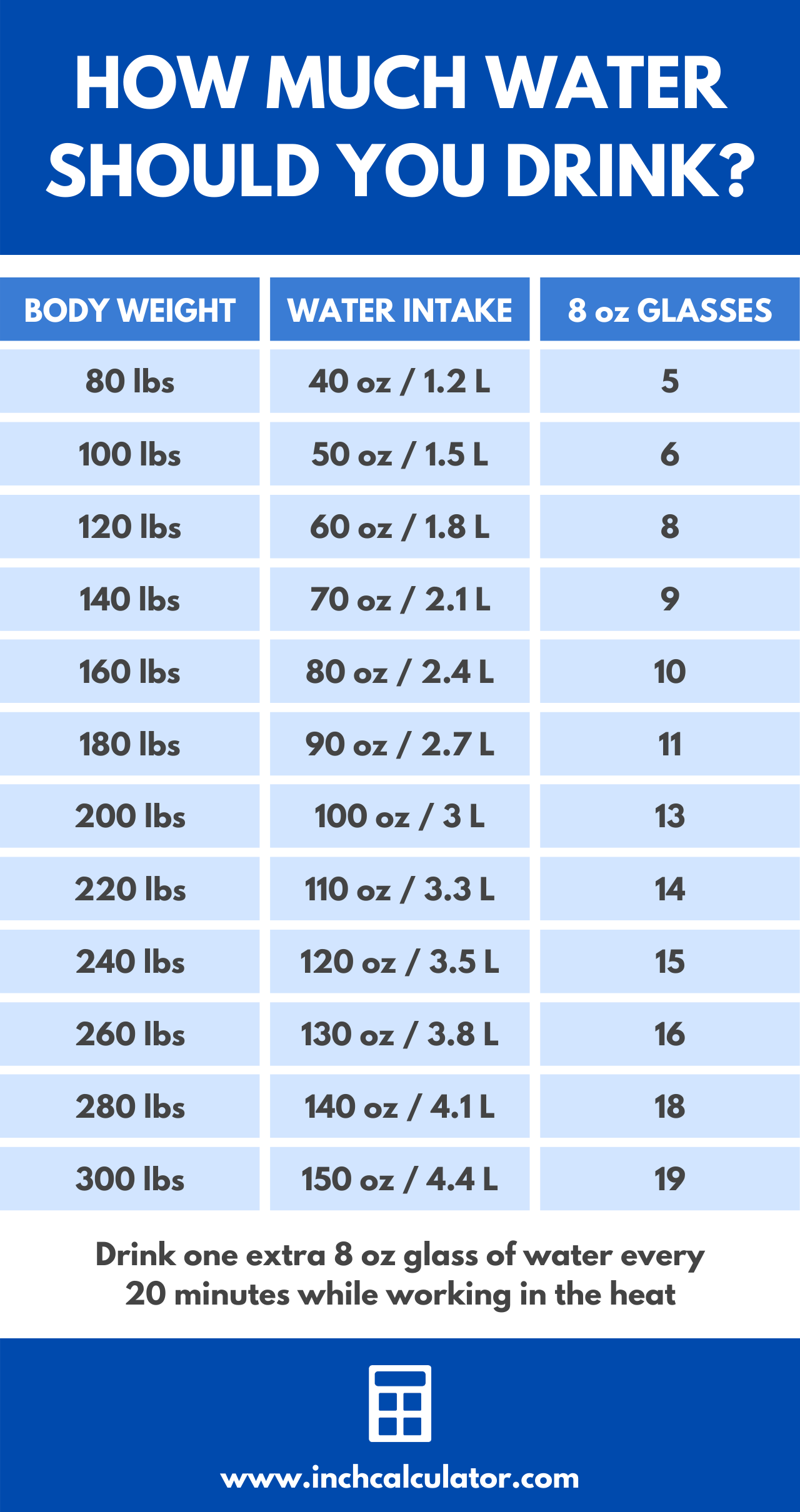Water Intake Calculator – How Much Water Should You Drink?
Ever wonder how much water you should drink? Calculate your daily water intake given your body size and time in the sun.
Results: Suggested Daily Water Intake
| ounces | |
| liters | |
| 8 oz glasses |
On this page:
How Much Water Should You Drink Per Day
Water is an essential part of your diet that often goes overlooked when talking about daily nutrient intake. Your body depends on water for a number of physiologic functions, and without it, you could not survive.
Water is necessary to digest foods, remove wastes from your body, maintain a normal body temperature, protect your organs and tissues, carry blood throughout your circulatory system, and lubricate your joints.
According to the U.S. National Academies of Sciences, Engineering, and Medicine, adequate daily fluid intake is about 3.7 liters of fluids a day for men (15.5 cups) and about 2.7 liters of fluids a day for women (11.5 cups).[1]
However, this will vary based on body weight and physical activity. For instance, individuals who are more active lose more fluids through perspiration and require higher amounts of water to maintain adequate hydration.
Similarly, people who live in warmer climates require more fluid intake on a daily basis. If you lose fluid through illness, such as gastroenteritis or a urinary tract infection, you will need to drink more water to replace these losses.
Similar to how we need to maintain a calorie balance every day to maintain our current weight, the amount of water we drink or consume each day needs to match the amount of water that our bodies lose.
Our main water losses are through urination and sweat; however, there are also water losses through the digestive tract and even when we breathe.
The contribution of water we consume from food is estimated to be around 20–30%. The majority of water, around 70–80%, is provided by what we drink.[2]
However, this is largely dependent on the type of foods and beverages that are consumed.[2] For example, fruits and vegetables have a much higher water content than other foods.
The amount of water that you need to drink each day varies based on your level of activity and how much time you spend in the heat. Most adults need 1/2 to 1 ounce of water per pound of body weight, plus 12 ounces for every 30 minutes of exercise or heat exposure.[3]
Water Intake Formula
water needed [oz] = body weight [lbs] + (12 × time exercising [min] ÷ 30)
While this does vary between individuals based on their sweat rates, this is a good way to estimate how much water you should aim to drink during the day.

Curious how much all that extra water you’re drinking water weighs? Try our water weight calculator to find out!
For example, a sedentary person weighing 180 pounds would need to consume about 90-180 ounces of water a day. This assumes they do no exercise and do not spend any time in the heat.
On the other hand, if this same person exercises for 60 minutes and spends another 30 minutes outdoors in the heat, they would need to drink an additional 36 ounces of water, bringing their total water consumption to 126 to 216 ounces of water.
180 pounds × 0.5-1 ounce = 90-180 ounces for no activity
12 ounces per 30 minutes of activity
90 minutes ÷ 30 minutes = 3
3 × 12 = 36 extra ounces of water for activity
90 + 36 = 126 ounces
180 + 36 = 216 ounces
One cup is equal to 8 ounces. So, when trying to determine how many glasses of water this is equivalent to, simply divide the total amount by 8 ounces.
For this person, that would be 15.75 to 27 cups of water based on their exercise and heat exposure that day.
126 ÷ 8 = 15.75 cups
216 ÷ 8 = 27 cups
This may seem like a lot of water, but as you can see, 15.75 cups is very close to the recommendation from the U.S. National Academies of Sciences, Engineering, and Medicine. And when more exercise or hotter weather is accounted for, the need for water intake increases.
In addition to using the formulas above, another way to monitor your hydration status is by the color of your urine.[4] This should be pale or clear colored. When urine looks dark or concentrated, this is a sign of dehydration.
However, diet, supplements, and medications can affect urine color.
How Much Water Should You Drink To Lose Weight
Keeping your body hydrated is essential for overall fitness and also aids in maintaining a healthy weight. Studies have shown that when coupled with good nutrition, drinking an adequate amount of water can increase weight loss.
Another benefit of staying well hydrated is that this can also decrease hunger cues. This helps you cut back on calorie intake throughout the day.
[5]
Research has also found that drinking water prior to a meal can help cut back on calorie consumption when combined with a lower-calorie diet. In one study, participants who drank two 8-ounce cups of water prior to each meal lost more weight than those who did not drink water prior to their meals.[5]
You don’t necessarily need to drink more than the recommended amount of water to aid in weight loss.
The key is to avoid dehydration, as this can hamper weight loss. In addition, many people confuse thirst with hunger. You may find that when you are dehydrated, you feel hungrier, which leads to increased calorie consumption and weight gain.
Another benefit of drinking water is that it helps you cut out sugary, high-calorie drinks from your diet. Choosing water instead of soft drinks or sugary juices helps you avoid empty calories that provide little nutritional value.[5]
Plus, adequate hydration is necessary to get the most out of your workouts, which in turn can stimulate weight loss. Whether it is aerobic exercise or weight training, your body needs enough water in order to perform at the highest level.[6][7]
When you can work out at a higher intensity or for longer periods of time, you will burn more calories. When you become dehydrated, symptoms such as muscle cramps, dizziness, and fatigue become more likely, resulting in lower performance and workout quality.
Studies have found that dehydration by 2% of your body mass impairs exercise performance, especially in hot conditions.
In addition to affecting aerobic exercise performance, dehydration has been found to decrease strength training performance as well.[7] This further emphasizes the need to stay well hydrated to improve your workout performance and aid in weight loss.
Tips To Stay Hydrated Throughout the Day
It can be tough to stay hydrated, and even more so on busy days. Making a conscious effort to drink more water throughout the day can go a long way in aiding overall health and weight loss. Some tips that can help you get in enough water throughout the day include:
- Bringing a water bottle to work with you that you can refill. This will help you keep track of your fluid intake and make it convenient to drink more water.
- Drinking water prior to, during, and after exercise to replace sweat losses.
- Avoiding soft drinks or alcoholic beverages with meals and instead choosing water. You can even add a lemon to add flavor without increasing the calorie content.
- Drink water instead of soft drinks or high sugar fruit juices. Not only does it hydrate you better, but it can help to prevent overeating.
- Increase fruits and vegetables in your diet. These foods have high water content, which also adds to your daily fluid intake. Fruits and vegetables also contain essential vitamins and minerals. Plus, their high fiber content will keep you full longer, which will also aid in weight loss.
Hydration for Healthy Living
Staying well-hydrated can even aid in maintaining or reaching a healthy weight. Plus, making water your drink of choice will keep you from consuming unnecessary calories from other beverages like high-calorie, sugar-filled soft drinks.
As you can see, drinking an adequate amount of water every day is just as important as eating the proper nutrients for living a healthy life.
Similar Nutrition Calculators
References
- U.S. National Academies of Science, Engineering, and Medicine, Dietary reference intakes for electrolytes and water, https://www.nationalacademies.org/our-work/dietary-reference-intakes-for-electrolytes-and-water
- EFSA Panel on Dietetic Products, Nutrition, and Allergies (NDA), Scientific opinion on dietary reference values for water, EFSA Journal, 2010, 8(3), 1459. https://efsa.onlinelibrary.wiley.com/doi/pdf/10.2903/j.efsa.2010.1459
- WebMD, 11 Easy Ways to Get More Water, https://www.webmd.com/diet/drink-more-water-tips
- Thornton S. N., Increased Hydration Can Be Associated with Weight Loss, Frontiers in Nutrition, 2016, 3, 18. https://doi.org/10.3389/fnut.2016.00018
- Dennis, E. A., Dengo, A. L., Comber, D. L., Flack, K. D., Savla, J., Davy, K. P., & Davy, B. M., Water consumption increases weight loss during a hypocaloric diet intervention in middle‐aged and older adults, Obesity, 2010, 18(2), 300-307. https://onlinelibrary.wiley.com/doi/full/10.1038/oby.2009.235
- Shirreffs, S. M., The importance of good hydration for work and exercise performance, Nutrition Reviews, 2005, 63(suppl_1), S14-S21. https://pubmed.ncbi.nlm.nih.gov/16028568/
- Judelson, D. A., Maresh, C. M., Farrell, M. J., Yamamoto, L. M., Armstrong, L. E., Kraemer, W. J., Volek, J.S., Spiering, B. A., Casa, D. J., & Anderson, J. M., Effect of hydration state on strength, power, and resistance exercise performance, Medicine and Science in Sports and Exercise, 2007, 39(10), 1817-1824. https://europepmc.org/article/med/17909410



